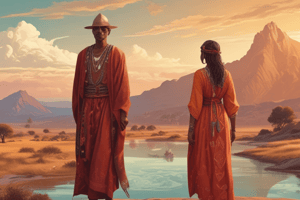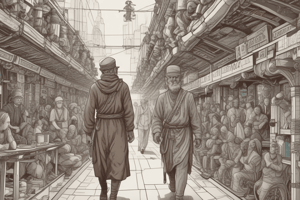Podcast
Questions and Answers
Which discipline examines the role of social structures and power dynamics in influencing culture?
Which discipline examines the role of social structures and power dynamics in influencing culture?
- Sociology (correct)
- History
- Anthropology
- Linguistics
Cultural Studies operates independently of other academic disciplines.
Cultural Studies operates independently of other academic disciplines.
False (B)
What is one key concept that travels between Sociology, History, and Media Studies?
What is one key concept that travels between Sociology, History, and Media Studies?
Ideology
Linguistics examines language and its role in shaping _____ and cultural identity.
Linguistics examines language and its role in shaping _____ and cultural identity.
Match the following disciplines with their primary focus:
Match the following disciplines with their primary focus:
How does media studies relate to ideology?
How does media studies relate to ideology?
Anthropology primarily studies historical events and their influences.
Anthropology primarily studies historical events and their influences.
What phenomena does Cultural Studies aim to understand?
What phenomena does Cultural Studies aim to understand?
The study of how dominant ideologies maintain control over culture is referred to as _____ discourse.
The study of how dominant ideologies maintain control over culture is referred to as _____ discourse.
Which discipline studies human cultures, focusing on rituals and social structures?
Which discipline studies human cultures, focusing on rituals and social structures?
Which area of study focuses on how images and narratives in media affect perceptions of social groups?
Which area of study focuses on how images and narratives in media affect perceptions of social groups?
Anthropology only investigates the historical aspects of cultures without considering their current practices.
Anthropology only investigates the historical aspects of cultures without considering their current practices.
What concept in sociology examines the exercise of power through societal norms and practices?
What concept in sociology examines the exercise of power through societal norms and practices?
The representation of indigenous peoples in Western media often portrayed them as ___ or ___ .
The representation of indigenous peoples in Western media often portrayed them as ___ or ___ .
Match the discipline with its focus regarding power and social structures:
Match the discipline with its focus regarding power and social structures:
What is a primary focus of anthropology in cultural studies?
What is a primary focus of anthropology in cultural studies?
The development of political ideologies such as capitalism and socialism is irrelevant to the history of power structures.
The development of political ideologies such as capitalism and socialism is irrelevant to the history of power structures.
Name one way in which history contributes to cultural studies.
Name one way in which history contributes to cultural studies.
Foucault's ideas about the regulation of populations fall under the concept of ___ .
Foucault's ideas about the regulation of populations fall under the concept of ___ .
What impact did the printing press have according to cultural studies?
What impact did the printing press have according to cultural studies?
What primary focus does Sociology provide concerning culture?
What primary focus does Sociology provide concerning culture?
Linguistics only studies the structure of language and has no relation to cultural studies.
Linguistics only studies the structure of language and has no relation to cultural studies.
What are the major methods used in Semiotics?
What are the major methods used in Semiotics?
Cultural Studies is situated at the intersection of multiple __________.
Cultural Studies is situated at the intersection of multiple __________.
Match the following concepts with their definitions:
Match the following concepts with their definitions:
Which discipline focuses primarily on the role of media in shaping cultural narratives?
Which discipline focuses primarily on the role of media in shaping cultural narratives?
Anthropology provides insights into macro-level cultural functions and structures.
Anthropology provides insights into macro-level cultural functions and structures.
Name one key takeaway for studying Cultural Studies.
Name one key takeaway for studying Cultural Studies.
Cultural Studies provides a __________ and holistic understanding of culture.
Cultural Studies provides a __________ and holistic understanding of culture.
Which of the following does NOT directly contribute to Cultural Studies?
Which of the following does NOT directly contribute to Cultural Studies?
Flashcards
Cultural Studies
Cultural Studies
A field of study that uses ideas from many disciplines to understand how cultures are shaped and how they shape societies.
Interdisciplinary Approach
Interdisciplinary Approach
Using ideas and methods from different academic fields to study a topic.
Culture's Influence
Culture's Influence
Cultural Studies explores how cultural factors influence and are influenced by societal, historical, and individual contexts.
Ideology
Ideology
Signup and view all the flashcards
Ideology (Sociology)
Ideology (Sociology)
Signup and view all the flashcards
Ideology (History)
Ideology (History)
Signup and view all the flashcards
Ideology (Media Studies)
Ideology (Media Studies)
Signup and view all the flashcards
Representation
Representation
Signup and view all the flashcards
Representation (Linguistics)
Representation (Linguistics)
Signup and view all the flashcards
Representation (Anthropology & Communication Studies)
Representation (Anthropology & Communication Studies)
Signup and view all the flashcards
Cultural Representation
Cultural Representation
Signup and view all the flashcards
Anthropology & Representation
Anthropology & Representation
Signup and view all the flashcards
Communication Studies & Representation
Communication Studies & Representation
Signup and view all the flashcards
Power in Sociology
Power in Sociology
Signup and view all the flashcards
Biopower & Governmentality
Biopower & Governmentality
Signup and view all the flashcards
History & Power
History & Power
Signup and view all the flashcards
Anthropology & Power
Anthropology & Power
Signup and view all the flashcards
Interdisciplinary Contributions
Interdisciplinary Contributions
Signup and view all the flashcards
History's Role in Cultural Studies
History's Role in Cultural Studies
Signup and view all the flashcards
Cultural Studies & Collaboration
Cultural Studies & Collaboration
Signup and view all the flashcards
Power Relations
Power Relations
Signup and view all the flashcards
Sociology's Contribution to Cultural Studies
Sociology's Contribution to Cultural Studies
Signup and view all the flashcards
Linguistics' Impact on Cultural Studies
Linguistics' Impact on Cultural Studies
Signup and view all the flashcards
Media's Role in Cultural Studies
Media's Role in Cultural Studies
Signup and view all the flashcards
Anthropology's Contribution to Cultural Studies
Anthropology's Contribution to Cultural Studies
Signup and view all the flashcards
Cultural Relativism
Cultural Relativism
Signup and view all the flashcards
Study Notes
Cultural Studies Overview
- Cultural Studies is interdisciplinary, combining various fields to understand culture
- It explores how culture interacts with society, history, and individuals
- It creates a holistic framework for understanding cultural phenomena
Key Disciplines and Relationships
- History: Studies the evolution of societies, ideologies, and cultures over time
- Sociology: Examines the relationship between individuals and society, including social structures and power dynamics which influence culture
- Linguistics: Analyzes language in shaping thought, communication, and cultural identity
- Communication & Media Studies: Investigates media's role in shaping perceptions, ideologies, and cultural narratives (e.g., television, film, internet)
- Anthropology: Studies human cultures, practices, rituals, and social structures
Core Concepts Across Disciplines
- Ideology: A system of beliefs justifying existing power structures (e.g., Marxism)
- Sociology: Explores ideology as a social control mechanism
- History: Ideologies shape historical events and movements (e.g., colonialism)
- Media Studies: Media transmits and reinforces ideologies, shaping public opinion
- Representation: How language, images, and narratives represent social groups, identities, and issues
- Linguistics: Language constructs meaning and reflects cultural values/power
- Anthropology: Cultures represent themselves and others through symbols/rituals
- Communication Studies: Focuses on how media creates/maintains representations
- Power and Control: The structure of social relations and institutions
- Sociology: Studies power dynamics, using theories like biopower and governmentality
- History: Analyzes historical use and exercise of power
- Anthropology: Examines how power is negotiated and maintained within different cultures
Interdisciplinary Contributions
- History: Provides temporal context, analyzing how cultures change over time (e.g., impact of printing press)
- Sociology: Offers theories on power, identity, and social structures
- Linguistics: Analyzes language in constructing meaning and identity
- Communication & Media Studies: Examines media's role in shaping ideologies and public opinion
- Anthropology: Provides insights into cultural practices, rituals, and daily life
Key Takeaways for the Exam
- Explain how Cultural Studies connects history, sociology, linguistics, media, and anthropology
- Emphasize the importance of interdisciplinary methods in studying culture
- Be prepared to discuss ideology, representation, and power in relation to cultural analysis
Studying That Suits You
Use AI to generate personalized quizzes and flashcards to suit your learning preferences.




